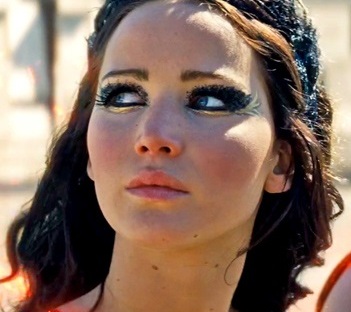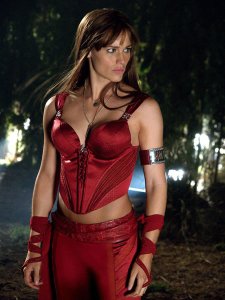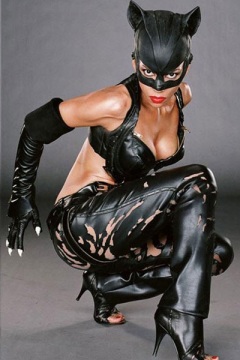I feel like the title of this post is a pretty bold statement and I hope it doesn’t ruffle some feathers. But I feel like I need to be bold and write this.
I’m a member of our local Junior League and we had our March meeting last night. Instead of having a traditional meeting we watched the documentary Miss Representation. If you haven’t seen/heard of it, here is a little bit about it:
Like drawing back a curtain to let bright light stream in, Miss Representation (87 min; TV-14 DL) uncovers a glaring reality we live with every day but fail to see. Written and directed by Jennifer Siebel Newsom, the film exposes how mainstream media contribute to the under-representation of women in positions of power and influence in America. The film challenges the media’s limited and often disparaging portrayals of women and girls, which make it difficult for women to achieve leadership positions and for the average woman to feel powerful herself.
In a society where media is the most persuasive force shaping cultural norms, the collective message that our young women and men overwhelmingly receive is that a woman’s value and power lie in her youth, beauty, and sexuality, and not in her capacity as a leader. While women have made great strides in leadership over the past few decades, the United States is still 90th in the world for women in national legislatures, women hold only 3% of clout positions in mainstream media, and 65% of women and girls have disordered eating behaviors.
Stories from teenage girls and provocative interviews with politicians, journalists, entertainers, activists and academics, like Condoleezza Rice, Nancy Pelosi, Katie Couric, Rachel Maddow, Margaret Cho, Rosario Dawson and Gloria Steinem build momentum as Miss Representation accumulates startling facts and statistics that will leave the audience shaken and armed with a new perspective. -from the film’s website
I had seen this a few years ago when it came out and really liked it (well, everything except Catherine Hardwicke’s little spiel). It didn’t really present any new information for me, but it made a pretty powerful point and I highly suggest you check it out.
During the documentary several young women (high school age) are interviewed and give their opinions on how women are represented in the media. It amazed me just how insightful these young women were. Anyway, it got to the part where they were discussing women in movies compared to men in movies. They showed all these powerful men heroes and their female counter parts. You can probably guess how the females looked.
One girl made the comment that there aren’t female protagonists like there are men. Female protagonists in movies either are trying to find love or deal with relationship drama. Female superheroes, while powerful, are glorified sex objects. And honestly… when you think about it… she was right.
Here’s where YA comes in. This documentary was made in 2010 and these women were not blessed with movies like The Hunger Games, City of Bones, and the upcoming Divergent. These are movies that feature a strong female protagonist who isn’t trying to find love and who certainly isn’t a sex object. They aren’t concerned with the things female protagonists in “chick flicks” are mostly concerned about (love, babies, men) and they aren’t dressed in skimpy pleather and expected to fight bad guys.
They are strong, heroic, flawed, awkward, curious, brave. They aren’t the most popular or the most beautiful or the most intelligent or the most anything. They are average people faced with extraordinary circumstances.
With the adaptation of so many YA novels into movies, more and more people are being introduced to these great characters, which in turn are perfect gateways to other books and fantastic characters.
It’s so important for women to find role models where they can, but when the media is throwing in our faces so much negativity towards women it’s easy to lose sight, faith, and trust in our role models. And for younger women, they are faced less with the women they need as role models and more with that negative image. This is why it’s so important that more and more strong characters get brought to life.*
*It’s also so important that positive role models be brought to the forefront and all the garbage we women are shown is pushed away so these bright, wonderful, brilliant women can be focused on. But that’s another post.
I love that one of the hottest trends is bringing YA books to life, especially ones that feature strong female protagonists. I’m not talking just the Katniss, Tris, and Clary characters; I’m talking the Hazel, the Mia, and the Hermione characters. Average people faced with extraordinary circumstances and coming out better for it.
So, tying into Top Ten Tuesday, here are some YA books with female protagonists that I feel need to be brought forth in the media as examples of what strong women are and need to be more of:
The Girl of Fire and Thorns series by Rae Carson
The Iron Fey series by Julie Kagawa
The Golden Compass by Phillip Pullman (already made into a movie!)
Code Name Verity and Rose Under Fire by Elizabeth Wein
Bitterblue by Kristen Cashore
So to answer my bold statement “why YA is good for women” I can simply say this: YA books give us female protagonists who have real struggles, real issues and real triumphs without becoming sex objects or chasing after a man. Perhaps it’s because since the protagonists are too young to be sex objects (thank goodness) we get to see them in situations where they can fail and triumph, without being sexualized or put into stereotypical roles traditionally reserved for women.
Also, I may have gotten a kick-ass idea for a dystopian/futuristic government novel while watching this documentary. 🙂




I like this!
LikeLike
Thank you! 🙂
LikeLike
So well said!
LikeLike
Thanks! 🙂
LikeLike
You bring up some very good points. The other day, I had a conversation at lunch about independent, non-sexualized female superheroes and the lack-thereof.
Another thing that sets off my feminist tendencies is classic Disney movies; with the exception of Mulan, they all portray women as damsels in distress. Heck, Snow White is known for singing “Someday My Prince Will Come.” There’s nothing wrong with wanting a knight in shining armor, but sometimes a girl needs to know that she can save herself.
LikeLike
There’s a HUGE lack of non-sexualized female superheroes! I don’t really think too much about it, but mostly because I don’t like female superhero movies. Maybe it’s because they’re overly sexualized. Light bulb!
The documentary actually does focus a small bit on Disney characters, but more so that they’re sexualized, not really the damsel in distress. Like the point out how scantily clad they are. Or at least that’s what I got from it. I’m a fan of the Disney princess movies and really don’t have a problem with them (well, the originals… some of the “sequels” I’m not a fan of) but do like that the trend with them seems to be moving towards more “save the day” princesses.
LikeLike
I’m a fan of the Disney classics, too, but as I got older I realized that they aren’t very flattering towards the role of women. I just usually shrug it off and watch them for the fluffy fun. Other than Jasmine and Ariel, I can’t think of any Disney girls that are scantily clad.
I love superhero movies, especially Spiderman, but I’m not a huge fan of any of the super heroines. Well, unless you count the few females in XMen. I love Rogue, Kitty, and Jean Grey.
LikeLike
This is a wonderful, insightful post, Candice. I know one reason I love reading in general – whether YA or adult or children’s – is that women are usually portrayed well. Even in romances, women aren’t sexualized (okay not the ones I’ve read anyways). I mean sure there are sexytimes, but there is more too it, I think.
And definitely in YA, there are some amazingly kickass women, women that are just regular people, rising to the occasion.
LikeLike
Thank you, thank you! Books definitely portray women pretty well. Even trashy romance novels portray women in a positive light. This documentary also addressed chick lit a little bit… but more like how people think it’s “bad” or “not smart” or whatever because it’s written for and/or by women. Lame. Some of the best books I’ve read have been written by women.
I love that YA gets to portray such strong characters and I love even more that they’re bringing brought to the big screen so young girls can see that they don’t have to wear next to nothing to be strong and fight evil or that they don’t have to pine and worry and fret and make their lives about love or relationships or babies or whatever to be worth something. I honestly think that’s what draws me to YA books vs more adult books and/or chick lit.
LikeLike
I couldn’t agree more. This is why I can get rather frustrated with authors that ignore their responsibility to their readership, especially when it’s a YA audience.
I also think you make an important point about showcasing the ‘Hermione’ character more. I mean, gotta love the kick-ass heroine, but it’s not something that all young women can acheive or aspire to. The strength in the face of danger, yes. But the physical prowess? Maybe not so much.
The power of the mind is something all of us can develop. The sharp wit and quick tongue rather than the strong fist.
Anyway! I really enjoyed this post. Thank you for writing it! 😀
LikeLike
You make a great point and a great argument against all those people who say things about YA being too girl-oriented. We NEED more of this in our culture
I saw a little discussion above about Disney movies and I rewatched Mulan this weekend… and was kind of annoyed at how Disney does portray a strong woman. In the end she is on the roof with the villain and disarms him, but instead of killing him with his own sword, she has Mushu shoot him off the roof with a firework. I know part of this cop out/illogical move probably has to do with showing outright violence in a kid’s movie, but if Mulan was a male character, I feel like things would have played out differently. And this is why I can’t watch Disney movies any more… too much grad school has made me rethink things like that!
LikeLike
Extremely true! People don’t realize that there are strong women in YA fiction. Sometimes I, myself, forget that when reading other books. However, if I am honest with myself, I can admit that so many strong females in YA novels helped to mold me and without them I wouldn’t be the same woman I am today.
LikeLike
I agree with you wholeheartedly. I think if women in movies aren’t portrayed as sex symbols, then they are leaning on the opposite spectrum of weak, relying on men characters such as the Disney princesses. I’ve recently got a bit obsessed with articles about Disney princesses being portrayed in such a weak light. These young girls are being exposed to these princesses with big eyes, small waists and marrying princes. I think that’s why I cling on to YA very easily. The female characters in these stories are tough and independent. This is probably why my favourite Disney princess is Mulan because she fits the YA female character criteria.
It’s good to think that we’re going in the right direction for gender equality. Even Disney is getting on board with the jabs in Frozen about “You can’t just marry a man you’ve just met” and the character of Elsa who doesn’t get paired up with any guy.
Lol sorry about the giant comment. Loved the post 😀
LikeLike
If you haven’t already, you should meet Merida in Brave.
LikeLike
Yes! She was pretty awesome. I liked the message of making your own fate. Definitely something we all need to be a bit more in control of!
LikeLike
I totally forgot about her! I love how she decides to make her own fate.
LikeLike
This is exactly why all the folks screaming for more boy protagonists in YA should relax. Everything ELSE is geared towards the strong male characters. Let the girls keep YA!
LikeLike
Woot! Maybe that’s why I love YA so much. Such great characters! 🙂 Sharing this post.
LikeLike
What a fabulous, thought-provoking post. And yes, totally agree with you on all your points. I also like that of the crop of YA books to film adaptations being made strong female protag’s–now if only these adaptations were as good as the books–but that’s an argument for another day 🙂
And I love the examples that you gave like Rae Carson’s books and Kristin Cashore’s–interested that you chose Bitterblue of the three in that series–I actually think Katsa in Graceling is one of the best YA heroines around (but I haven’t yet read Bitterblue so there’s that.)
Great post, thanks for taking the time to speak your mid on this subject.
LikeLike
I truly loved Katsa and she certainly has a place among the great YA heroines. But for the particular list I was creating I thought Bitterblue fit in better. She wasn’t the strongest or the bravest girl – like we saw in Katsa and Fire – and was faced with an extraordinary challenge (being queen of a pretty broken country). She was smart, savvy and clever. Bitterblue was my least favorite of the series, but definitely think she serves as a good example of a strong female character.
And thanks for stopping by! I really enjoyed this post and the responses a lot more than I thought! And yes… if only those adaptations were as good as the books! 🙂
LikeLike